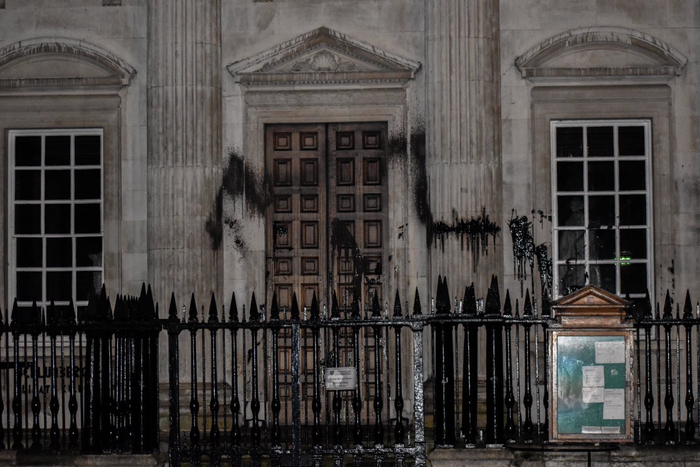Out on the road and out of touch: Extinction Rebellion
Following their “oiling” of Senate House, columnist Hugh Jones criticises Extinction Rebellion for their lack of self-awareness

The activism of Extinction Rebellion (XR) has always been performative, deliberately so. Blocking traffic with a painted boat parked outside the Royal Courts of Justice, and holding a giant ‘funeral’ on Oxford Street, both with the aim of drawing attention to climate change, are prime examples. There is nothing intrinsically wrong with this, and despite what this Government seems to think, the right to protest is a vital one, worth protecting, even if it means inconveniencing the general public.
Yet, things have changed since the Summer of 2019 when both of these examples took place. Then, XR’s radicalism and the sheer intensity of their activism made them impossible to ignore, and (arguably) they played a role in drawing attention to climate change as a major problem. Now, however, that message has been effectively conveyed. According to YouGov, 72% of UK adults now believe in man-made climate change, a modest increase from 69% in July 2019. More significantly, both Labour and the Conservatives are committed to fighting climate change, with Johnson’s government hosting the COP26 summit last year. In light of all of this, actions like throwing fake oil at the Senate House on the 15th of January lose a lot of their resonance.
“By desecrating the Senate House, XR’s political theatre has turned to farce”
The more you dig into what XR believe, the less sensible their protests seem, even in the context of the goals which XR themselves seek to achieve. XR have three main demands: that governments declare a ‘climate emergency’ (achieved in May 2019 in the UK), that governments act to halt biodiversity loss and achieve net-zero carbon emissions by 2025, and that governments hold and are led by citizens’ assemblies on climate and ecological justice.
By oiling the Senate house, XR were primarily pursuing the second of these goals. The University of Cambridge has a partnership with the oilfield services company Schlumberger, who provide a substantial amount of funding. XR object to this on the grounds that fossil fuels are contributing to climate change.
The problem with this, is that not everyone who disagrees with XR’s maximalist approach to tackling climate change is an evil climate denier. For example, there is a compelling argument – one which seems about to be endorsed by the EU – that natural gas is green, during the transition from dirtier fuels, especially coal, to still-developing technologies like wind and solar. This has been fervently criticised by climate activists, but the alternative is likely to be worse for people and the planet in the interim.
If partnering with Schlumberger means that the University can help to bring down the price of gas, reduce the cost of living for our poorest citizens, and avoid coal being used to offset an unmet need for power, then doing so will reduce net carbon emissions and should be considered green. If forced to choose between having electricity and being carbon-neutral, no-one is going to choose the latter.
“XR claims to be a broad church but behave like self-righteous fanatics”
There is a contradiction in XR’s basic philosophy which means they are unable to countenance such a possibility. XR insist on the importance and urgency of the climate crisis, but rather than seeing that this means that ruthless pragmatism is essential, they instead use it to justify counterproductive action. XR should be encouraging the University to take as much of Schlumberger’s money as possible, and to use it to research green technologies, and they should be lobbying Schlumberger not to cease operations and pay compensation, which they are obviously never going to do, but rather to focus on activities which would benefit the green transition – including by continuing to produce gas if it is needed.
By desecrating the Senate House, XR’s political theatre has turned to farce. Fundamentally, they fail to recognise that they do not have a monopoly on caring about the climate, and that being the most extreme and disruptive person in the room does not make you right. More importantly, despite their claim to be a people-led movement, XR don’t seem particularly interested in meaningfully engaging with others.
This is perhaps the most common accusation levelled at XR: that they are fundamentally out of touch; they loudly demand that governments “tell the truth”, but don’t seem that interested in using their free speech to actually make a case for their contentious and extreme position, preferring to shout until everyone else agrees with them. They then disrupt the free press as part of a campaign called “free the press” – and justify it because they think they’re right, which apparently makes it OK to stifle the opinions of others. Protestors in Cambridge articulated a belief that anti-capitalism is essential to fight climate change. When most people in this country quite like capitalism, and when private capital is going to be essential when it comes to footing the bill for the green transition, anti-capitalism is counterproductive.
Moreover, in perhaps the most egregious example of XR’s lack of self-awareness, a group of which just 17% of the British public approve, thinks that instituting citizens’ assemblies – a legislature whose members are randomly selected rather than elected – would lead to the adoption of their policies, rather than an overwhelming rejection of them.
XR claims to be a broad church but behave like self-righteous fanatics. They treat fringe policies as unquestionable moral imperatives, allow themselves to be led by often counterproductive dogma, and, via their protests, alienate the very people they need to win over. If XR are as serious as they say they are, they will drop the pieties and the placards and get to work. There is so very much to be done.
 News / Cambridge study finds students learn better with notes than AI13 December 2025
News / Cambridge study finds students learn better with notes than AI13 December 2025 News / Cambridge Vet School gets lifeline year to stay accredited28 November 2025
News / Cambridge Vet School gets lifeline year to stay accredited28 November 2025 Science / Did your ex trip on King’s Parade? The science behind the ‘ick’12 December 2025
Science / Did your ex trip on King’s Parade? The science behind the ‘ick’12 December 2025 News / Uni Scout and Guide Club affirms trans inclusion 12 December 2025
News / Uni Scout and Guide Club affirms trans inclusion 12 December 2025 Arts / Modern Modernist Centenary: T. S. Eliot13 December 2025
Arts / Modern Modernist Centenary: T. S. Eliot13 December 2025










